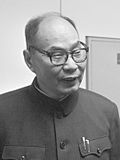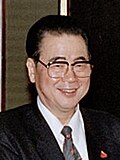| No. | Portrait | Name (Birth–Death) | Term of office | Important offices held during tenure | Premier | Ref. |
|---|
| Took office | Left office | Term |
|---|
| Minister of Education of the Central People's Government |
|---|
| 1 |  | Ma Xulun
马叙伦
(1885–1970) | 19 October 1949 | 15 November 1952 | 3 years, 27 days | Member of the Central People's Government
Deputy Director of the Cultural and Educational Committee of the Central People's Government
Director of the Chinese Character Reform Research Committee
Chairman of the China Democratic League | Zhou Enlai | [4] |
|---|
| 2 |  | Zhang Xiruo
张奚若
(1889–1973) | 15 November 1952 | 28 September 1954 | 1 year, 317 days | Vice Chairman of the Political and Legal Affairs Committee of the State Council
President of the Chinese People's Institute of Foreign Affairs | [5] |
|---|
| Minister of Education of the People's Republic of China |
|---|
| 2 |  | Zhang Xiruo
张奚若
(1889–1973) | 28 September 1954 | 11 February 1958 | 3 years, 136 days | Director of the Foreign Cultural Liaison Committee
President of the Chinese People's Institute of Foreign Affairs | Zhou Enlai | [5] |
|---|
| 3 |  | Yang Xiufeng
杨秀峰
(1897–1983) | 11 February 1958 | 22 July 1964 | 6 years, 162 days | Secretary of the Party Leadership Group of the Ministry of Education
Deputy Director of the Second Office of the State Council | [6] |
|---|
| – |  | Liu Jiping
刘季平
(1915–1990) | 22 July 1964 | 4 October 1964 | 74 days | Deputy Secretary of the Party Leadership Group of the Ministry of Education | [7] |
|---|
| 4 |  | He Wei
何伟
(1910–1973) | 4 October 1964 | 26 July 1968 | 3 years, 296 days | | [8] |
|---|
| Director of the Military Control Commission of the Ministry of Education |
|---|
| – |  | Zhu Kui
朱奎
(1916–1982) | 26 July 1968 | 22 June 1970 | 1 year, 331 days | | Zhou Enlai | [9] |
|---|
| From 22 June 1970 to 17 January 1975, the post of Minister of Education was abolished. |
| Minister of Education of the People's Republic of China |
|---|
| 5 |  | Zhou Rongxin
周荣鑫
(1917–1976) | 17 January 1975 | 13 April 1976 | 1 year, 87 days | | Zhou Enlai
↓
Hua Guofeng | [10] |
|---|
Vacant
13 April 1976 – 25 January 1977 |
| 6 |  | Liu Xiyao
刘西尧
(1916–2013) | 25 January 1977 | 23 February 1979 | 2 years, 29 days | Secretary of the Party Leadership Group of the Ministry of Education | Hua Guofeng | [11] |
|---|
| 7 |  | Jiang Nanxiang
项怀诚
(1913–1988) | 23 February 1979 | 4 May 1982 | 3 years, 70 days | Secretary of the Party Leadership Group of the Ministry of Education | Hua Guofeng
↓
Zhao Ziyang | [12] |
|---|
| 8 |  | He Dongchang
何东昌
(1923–2014) | 4 May 1982 | 18 June 1985 | 3 years, 45 days | Secretary of the Party Leadership Group of the Ministry of Education
Vice Chairman of the Academic Degrees Committee of the State Council | Zhao Ziyang | [13] |
|---|
| Director of the State Education Commission of the People's Republic of China |
|---|
| 9 |  | Li Peng
李鹏
(1928–2019) | 18 June 1985 | 12 April 1988 | 2 years, 299 days | Vice Premier of the State Council
Head of the State Council's Electronic Revitalization Leading Group
Secretary of the CCP Secretariat
Member of the CCP Politburo Standing Committee
Acting Premier of the State Council | Zhao Ziyang
↓
Li Peng | [14] |
|---|
| 10 |  | Li Tieying
李铁映
(born 1936) | 12 April 1988 | 29 March 1993 | 4 years, 351 days | Secretary of the Party Leadership Group of the State Education Commission
Member of the CCP Politburo
State Councillor | Li Peng | [15] |
|---|
| 11 |  | Zhu Kaixuan
朱开轩
(1932–2016) | 29 March 1993 | 10 March 1998 | 4 years, 346 days | Alternate Member of the CCP Central Committee
Director of the NPC Education, Science, Culture and Public Health Committee | [16] |
|---|
| Minister of Education of the People's Republic of China |
|---|
| 12 |  | Chen Zhili
陈至立
(born 1942) | 10 March 1998 | 17 March 2003 | 5 years, 7 days | Secretary of the Party Leadership Group of the Ministry of Education | Zhu Rongji | [17] |
|---|
| 13 |  | Zhou Ji
周济
(born 1946) | 17 March 2003 | 31 October 2009 | 6 years, 228 days | Secretary of the Party Leadership Group of the Ministry of Education | Wen Jiabao | [18] |
|---|
| 14 |  | Yuan Guiren
袁贵仁
(born 1950) | 31 October 2009 | 2 July 2016 | 6 years, 245 days | Secretary of the Party Leadership Group of the Ministry of Education | Wen Jiabao
↓
Li Keqiang | [19] |
|---|
| 15 |  | Chen Baosheng
陈宝生
(born 1956) | 2 July 2016 | 20 August 2021 | 5 years, 49 days | Secretary of the Party Leadership Group of the Ministry of Education | Li Keqiang | [20] |
|---|
| 16 |  | Huai Jinpeng
怀进鹏
(born 1962) | 20 August 2021 | Incumbent | 4 years, 86 days | Secretary of the Party Leadership Group of the Ministry of Education | Li Keqiang
↓
Li Qiang | [21] |
|---|













